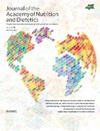咖啡、PI3K 信号通路与前列腺癌:健康专业人员随访研究中的一项前瞻性研究。
IF 3.5
2区 医学
Q2 NUTRITION & DIETETICS
Journal of the Academy of Nutrition and Dietetics
Pub Date : 2025-01-01
DOI:10.1016/j.jand.2024.07.001
引用次数: 0
摘要
背景:咖啡摄入量越高,患前列腺癌(尤其是侵袭性前列腺癌)的风险越低。PI3K 信号通路的激活在前列腺癌的发生中起着重要作用:目的:在美国进行的前瞻性队列研究 "健康专业人员随访研究"(Health Professionals Follow-up Study)中,评估诊断前咖啡摄入量与前列腺癌男性患者肿瘤组织中 PI3K 激活评分、PI3K 调节因子和下游效应因子的表达/存在之间的关系:设计:采用病例研究设计。咖啡摄入量通过 1986 年完成的有效食物频率问卷进行评估,此后每四年评估一次,直至确诊前列腺癌:研究参与者包括1986年至2009年期间确诊为前列腺癌的1242名男性,其肿瘤标志物由肿瘤标本的组织芯片进行评估:结果包括PI3K激活评分、胰岛素受体和IGF1受体的表达、血管生成标志物、肿瘤抑制因子PTEN的存在、慢性和急性炎症、单纯萎缩和萎缩后增生:进行了多变量线性或逻辑回归,以估计咖啡摄入量与肿瘤标志物表达/存在之间的关联:结果:在咖啡饮用者(占总人口的86.6%)中,咖啡摄入量的中位数(第25-75位)为2(1-3)杯/天。咖啡摄入量与相关肿瘤标志物之间的关系普遍较弱,精确度不高。当将每天喝咖啡超过 3 杯的男性与不喝咖啡的男性进行比较时,PI3K 激活评分和血管生成标志物的绝对百分比差异从 0.6% 到 3.6% 不等。PTEN缺失、IGF1受体和胰岛素受体表达、存在慢性和急性炎症、单纯萎缩和萎缩后增生的几率比也没有统计学意义,不精确,在0.82到1.58之间:在前列腺肿瘤组织中,未观察到咖啡摄入与PI3K活化、相关调节因子和几种效应因子有关。要研究咖啡与前列腺癌关系的潜在机制,还需要探索其他途径或致癌过程中的更早步骤。本文章由计算机程序翻译,如有差异,请以英文原文为准。
Coffee, Phosphoinositide 3-Kinase Signaling Pathway, and Prostate Cancer: A Prospective Study in the Health Professionals Follow-Up Study
Background
Higher coffee intake has been associated with reduced risk of prostate cancer, particularly aggressive forms. The activation of the phosphoinositide 3-kinase (PI3K) signaling pathway plays an important role in prostate carcinogenesis.
Objective
To evaluate associations between prediagnostic coffee intake and a PI3K activation score, the expression/presence of PI3K regulators, and downstream effectors in tumor tissue from men with prostate cancer in the Health Professionals Follow-Up Study, a prospective cohort study conducted in the United States.
Design
A case-only study design was applied. Coffee intake was assessed using validated food frequency questionnaires completed in 1986 and every 4 years thereafter until prostate cancer diagnosis.
Participants setting
Study participants comprised 1242 men diagnosed with prostate cancer from 1986 to 2009 and with tumor markers assessed from tissue microarrays constructed from tumor specimens.
Main outcome measures
The outcomes include the PI3K activation score; expression of insulin receptor and insulin-like growth factor 1 receptor; angiogenesis markers; and presence of the tumor suppressor phosphatase and tensin homolog, chronic and acute inflammation, simple atrophy, and post-atrophic hyperplasia.
Statistical analyses performed
Multivariable linear or logistic regression was conducted to estimate associations between coffee intake and tumor marker expression/presence.
Results
Among coffee drinkers (86.6% of the population), median (25th, 75th percentile) coffee intake was 2 c/day (1, 3 c/day). The associations between coffee consumption and the tumor markers of interest were generally weak with modest precision. When comparing men who drank >3 c/day coffee with nondrinkers, the absolute percent difference in the PI3K activation score and angiogenesis markers ranged from 0.6% to 3.6%. The odds ratios for phosphatase and tensin homolog loss, insulin-like growth factor 1 receptor and insulin receptor expression, and presence of chronic and acute inflammation, simple atrophy, and postatrophic hyperplasia also were not statistically significant, were imprecise, and ranged from 0.82 to 1.58.
Conclusions
Coffee intake was not observed to be associated with PI3K activation, related regulators, and several effectors in prostate tumor tissue. Studies exploring alternative pathways or earlier steps in carcinogenesis are needed to investigate the underlying mechanisms of the coffee and prostate cancer association.
求助全文
通过发布文献求助,成功后即可免费获取论文全文。
去求助
来源期刊

Journal of the Academy of Nutrition and Dietetics
NUTRITION & DIETETICS-
CiteScore
7.20
自引率
10.40%
发文量
649
审稿时长
68 days
期刊介绍:
The Journal of the Academy of Nutrition and Dietetics is the premier source for the practice and science of food, nutrition, and dietetics. The monthly, peer-reviewed journal presents original articles prepared by scholars and practitioners and is the most widely read professional publication in the field. The Journal focuses on advancing professional knowledge across the range of research and practice issues such as: nutritional science, medical nutrition therapy, public health nutrition, food science and biotechnology, foodservice systems, leadership and management, and dietetics education.
 求助内容:
求助内容: 应助结果提醒方式:
应助结果提醒方式:


